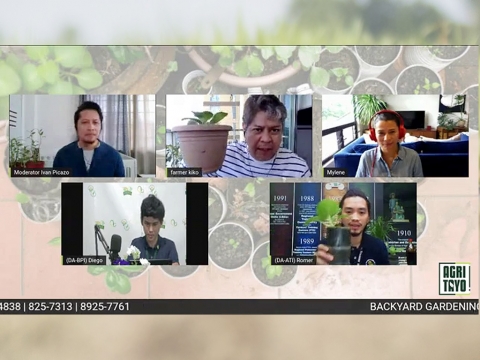Urban farming advocates led by Sen. Kiko Pangilinan share some tips on growing vegetables using small pots and containers on the third episode of Agri Tayo.
DILIMAN, Quezon City—Practitioners of urban agriculture in the country are stressing the importance of having the willingness to learn proper seed-to-table techniques as key to productive farming at home.
“You will always reap something from gardening, whether good or bad… This is a learning experience for everybody, and there are so many resources out there available for us to learn from,” celebrity farmer Mylene Dizon said.
In the third episode of Agri Tayo, dubbed as “Meet Your (Urban) Garden II”, Dizon called on everyone to start urban gardening now.
“If you’ve been thinking of starting a garden, the time is now. Start doing your research, plant whatever seeds you have at home. If you fail, do not be discouraged,” Dizon added.
Dizon is among the panel of speakers in the Facebook-streamed program spearheaded by the Office of Senator Francis “Kiko” Pangilinan, in collaboration with the Department of Agriculture (DA). It aims to recognize the efforts of farmers who also serve as frontliners during the present health crisis.
Other guest experts during the episode include agriculturists Romer Peñamora of the Agricultural Training Institute and Jose Diego Roxas of the Bureau of Plant Industry. Respectively, they shared tips on urban gardening and the services under the DA’s “Plant, Plant, Plant” Program.
Peñamora also talked about soil, water, and sunlight requirements for different crops and how to make organic fertilizers such as fermented plant juice, fermented fruit juice, and fish amino acid.
Meanwhile, the farmer-senator showed the steps in making oriental herb nutrients (OHN), a natural pesticide which can also support plant growth. Sprayed two to three times, usually in the afternoon, the OHN can help protect crops against pests like aphids and armyworms.
“Every time you harvest, the nutrients in the soil are depleted, so you have to restore the nutrients. That is why you have to use organic ingredients,” Pangilinan said, as he stressed the need for proper plant care to minimize losses and ensure safe food production.
“You do not feed the plant, you feed the soil,” he added.
Other tips from the panel include knowing which crops are appropriate to a given location and providing the ideal growing conditions for the plant. They also advised against the use of medical-grade materials, like face masks, as plant containers to avoid health hazard.
“There’s still a lot to learn, that’s the thing about agriculture. It’s very interesting,” Pangilinan pointed out.
Hosted by Ivan Picazo of Impact Leadership, the said urban agri episode was streamed last July 9 on Facebook and garnered more than 50,000 views from different social media users nationwide.

